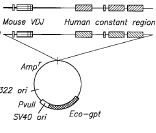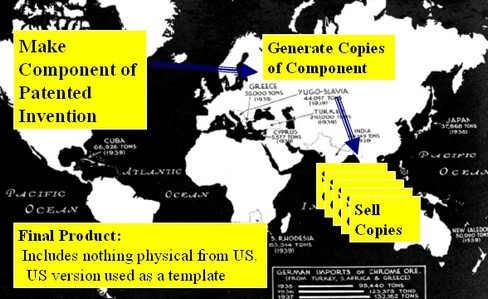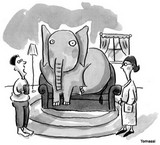By Dennis Crouch [dcrouch@gmail.com]
Background: Teleflex and its supporters have now filed their briefs in defense of the Federal Circuit’s methodology for determining whether a patent is “obvious.” [Copies of briefs are provided below]. The doctrine of nonobviousness is fundamental to our patent system. In order to be eligible for a patent an invention must be both novel and non-obvious. Novelty is generally narrowly applied to cases where the invention is identical to something already in the public domain. Obviousness, however, is a more difficult beast and is intended to ensure that patent rights are only granted to inventions that move us a significant distance past the prior art.
Obviousness has always been a “squishy” term, but over the past twenty-five years, the Court of Appeals for the Federal Circuit has developed a somewhat objective nonobviousness doctrine using a teaching/suggestion/motivation (TSM) test. According to the test, when various pieces of prior art each contain elements of an invention, the prior art can be combined together to invalidate a patent on the invention only when there is some motivation, suggestion, or teaching to combine the prior art. One problem with any obviousness test is hindsight bias. It is all-to-easy to look-back and assert that an invention would have been obvious. One purpose of the objective TSM test is to avoid this type of hindsight bias.
KSR has asked the Supreme Court to rethink that approach and take a fresh look at the obviousness standard for patentability. The petition questions whether obviousness should require any proof of some suggestion or motivation to combine prior art references.
Question Presented: Whether the Federal Circuit erred in holding that a claimed invention cannot be held "obvious," and thus unpatentable under 35 U.S.C. sec. 103(a), in the absence of some proven "'teaching, suggestion or motivation' that would have led a person of ordinary skill in the art to combine the relevant prior art teachings in the manner claimed"?
Interestingly, the Supreme Court has not heard an obviousness since well before the founding of the Federal Circuit. In that case (Sakraida 1976), the Court held that a combination which only unites old elements with no change in their respective functions is precluded from patentability under 103(a). Under the Sakraida standard, the Teleflex patent is arguably obvious. In an article several years ago, Professor John Duffy identified this obviousness issue as one that should attract the Supreme Court’s attention.
[The Federal Circuit’s suggestion] test, which tends to make even seemingly trivial developments patentable, is entirely the Federal Circuit’s product. It has no basis in the Supreme Court’s case law and may, in fact, be inconsistent with the Court’s most recent pronouncement on the subject (though that precedent is now more than a quarter century old).
Duffy, The Festo Decision and the Return of the Supreme Court to the Bar of Patents, 2002 S.Ct. Rev. 273, 340-41 (2003). Now, Duffy, a former clerk of Justice Scalia, is part of the KSR team that is trying to change the rule of law. The KSR case itself concerns a patent covering a gas pedal for an automobile. KSR makes pedals for GM & Chevy trucks and was sued for infringement of the Teleflex patent.
A discussion of briefs in support of the petitioner are found here: Discussion of Breifs Supporting Petitioner.
What follows is a discussion of briefs in support of the respondent: (i.e., in support of the status quo).
Respondent Teleflex: Brief on the Merits
Settled Law: Respondent begins with a compelling exposition on the power of stare decisis. “Millions of patents” have issued based on the suggestion test, and modifying that test would in Hal Wegner’s words, “threaten the validity of literally hundreds of thousands of existing patents still in force.”
Non-Rigid Test: Respondent defines the suggestion test as a “flexible [test that] looks to any available indication that a practitioner in the art would have had some reason to select the elements of the invention from among the prior art and combine them in the manner claimed by the invention.” Relying heavily on the CAFC’s very recent obviousness pronouncements of Dystar and Alza, the brief points out that a suggestion does not need to be found in prior art, but rather can be implicit in the nature of the problem, customer demand, similarity between references, knowledge of PHOSITA, wide knowledge of value of feature to be combined, etc. [DDC: Query whether the broad application of implicit suggestions would constructively eliminate the rule.]
The suggestion test can be contrasted with the “synergy” test proposed by petitioner and the “extraordinary level of innovation” test from the Solicitor General. Those approaches essentially mirror the pre-103 requirement of an “invention.” According to Judge Rich, “The first policy decision underlying Section 103 was to cut loose altogether from the century-old term ‘invention.’”
Intellectual Property Owners Association (IPO) in Support of Respondent:
The IPO is an organizatoin of intellectual property owners. MBHB (where I am of counsel) filed the brief on behalf of IPO. IPO’s brief supports the motivation requirement as an objective but flexible and practical approach to the obviousness problem. IPO hits on the hindsight problem:
[The test must rely on] objective evidence, not mere unsupported opinion or argument. Otherwise, the inevitable use of hindsight will tend to render meritorious inventions "obvious" by using the inventor’s own teachings as a roadmap to piece together prior art references in ways that would not have been obvious at the time of the invention.
IPO also takes-issue with any “synergy” requirement. Synergy occurs when the "the interaction of elements that when combined produce a total effect that is greater than the sum of the individual elements." There are many patent-worthy inventions, however, that lack true synergy. In addition, the Solicitor General’s proposed "extraordinary level of innovation" requirement goes too far. “Nothing in the patent statute suggests that patents should only be awarded to Nobel laureates.”
Paul Berghoff, Jeremy Noe, and Aaron Barkoff (of OrangeBookBlog) are on the brief.
American Intellectual Property Law Association (AIPLA) in Support of Respondent:
AIPLA’s brief is a fun read — it starts off with quotes from Billy Wilder and King Solomon, both of which give us pause on the question of hindsight.
What has been is what will be,
and what has been done is what will be done;
there is nothing new under the sun.
According to AIPLA, King Solomon wasn’t so wise — perhaps because his vision of the past was colored by hindsight. The CAFC’s test of obviousness is useful because it helps avoid hindsight.
TSM is a well-established, thoughtfully-analytic framework that provides certainty and uniformity in obviousness determinations while allowing proper flexibility. By requiring a showing of why someone of ordinary skill in the relevant art would think the invention obvious, it functions as a critical evidentiary device that prevents arbitrary decisions driven by hindsight.
As is typical of opposition briefs, the AIPLA correctly notes that the CAFC’s suggestion test does not require that the suggestion be explicit or written.
I can concieve of a strong [and thus far unstated] argument that it would be sensible to require that the suggestion be written and explicit. At this point in history, we have more people writing than ever before and those people are each writing more than earlier writers. At the same time, search costs are dropping dramatically and will continue to drop. In this scenario, why would we need to allow the evidentiary nightmare of giving weight to previously unstated suggestions to find an invention obvious?
Professor Thomas Field of Franklin Pierce in Support of Respondent:
Professor Field looks at the CAFC and its role in the patent process. Unlike its predecesor CCPA, the CAFC hears both administrative patentability and litigation based cases. That means that the CAFC must “confront the consequences of unwaranted grants.”
If the problem is the grant of too-many patents, the CAFC has little to say there because the court has no role in granting patents except to occasionally rule that the BPAI’s bases for rejection are unsupported.
Pre- and post-grant opposition proceedings may be the answer, but those decisions are for Congress.
ABA in Support of Respondent:
ABA amicus briefs are always difficult to obtain becauase they need the support of both the IP Section and the entire ABA House of Delegates. Here, the way to consensus was not to argue that the TSM test is the best test, but rather to note that it is useful, objective, and deeply rooted in the Supreme Court’s John Deere jurisprudence. In addition, the test is well settled, and messing with the test would have a far-reaching and complex impact on the economy and state of innovation.
If some elusive method not based on evidence were to be substituted for the present inquiry, hundreds of thousands of patents granted under the teaching-suggestion-motivation methodology would be immediately placed under a cloud.
Harold Milton in Support of Respondent:
Harold Milton drafted the claims being asserted by Teleflex and has filed a very interesting brief in support of Teleflex. Interesting because he begins with a statement that the suggestion test is illusory, or at least a misnomer. There is no requirement that there be any specific statement of suggestion in the prior art. Nonetheless, the test is important to maintain an “objective standard of patentability” and “consistent evaluation.” It also prevents chaos:
Without an objective standard, chaos would be multiplied across thousands of patent examiners, judges, juries, attorneys, etc. and would result in inconsistent decisions on patentability.
According to Milton, the Court should reject the suggestion test and stick to its prior decisions that obvious is found when there is a “mere selection of prior art elements combined to perform the identical function as they did separately in the prior art.”
Lee Thomason in Support of Respondent:
Thomason is a Kentucky-based patent attorney. One interesting aspect of his argument involves the law/equity distinction. According to Thomason, challenges to validity are equitable in their origins as evidenced both by the recited equitable factors of 103(a) (“as a whole”) and by Blackstone’s recitation of the writ fo scire facias. As such, any changes to the rule should be to review obviousness decisions “according to the standard applied to equitable rulings.” Equitable review requires a full discussion of the record and results in more predictability.
[Please e-mail briefs in support of respondent to me at dcrouch@gmail.com]
Documents:
-
On the Merits
-
Petitions Stage
- Party Briefs
-
Amicus Briefs
Links:
Cite as Dennis Crouch, “KSR v. Teleflex: In Support of the Status Quo,” Patently-O, available at https://patentlyo.com.
 As you read this, keep in mind Michael Slonecker’s recent remark that “predictions are the musings of fools.” In late November, the Supreme Court heard oral arguments in KSR v. Teleflex — the case that will determine what constitutes a “nonobvious” invention. Then, last week, Justice Scalia briefly discussed the case at a meeting of technology business group and was quoted as saying: “I know how that one comes out, but I'm not going to tell you.” What does Scalia’s quote mean? Perhaps nothing, but it might mean that the court has already come to a unanimous consensus on the case.
As you read this, keep in mind Michael Slonecker’s recent remark that “predictions are the musings of fools.” In late November, the Supreme Court heard oral arguments in KSR v. Teleflex — the case that will determine what constitutes a “nonobvious” invention. Then, last week, Justice Scalia briefly discussed the case at a meeting of technology business group and was quoted as saying: “I know how that one comes out, but I'm not going to tell you.” What does Scalia’s quote mean? Perhaps nothing, but it might mean that the court has already come to a unanimous consensus on the case.  Lacavera v. Dudas (on Petition for Certiorari).
Lacavera v. Dudas (on Petition for Certiorari).  MedImmune v. Genentech (Supreme Court 2006, 05–608)
MedImmune v. Genentech (Supreme Court 2006, 05–608) 

 Serious engineers and scientists don’t necessarily fit well in the policy-wonk culture of DC. Rumor has it that the whole Potomac area is a bit of a revolving door with the transient politico-intelligencia moving in-and-out as politics shift and families grow. The USPTO is no different, and it is no secret that the agency is having trouble hiring qualified patent examiners as well as retaining those who are there and doing a great job.
Serious engineers and scientists don’t necessarily fit well in the policy-wonk culture of DC. Rumor has it that the whole Potomac area is a bit of a revolving door with the transient politico-intelligencia moving in-and-out as politics shift and families grow. The USPTO is no different, and it is no secret that the agency is having trouble hiring qualified patent examiners as well as retaining those who are there and doing a great job.  KSR v. Teleflex (Supreme Court 2006).
KSR v. Teleflex (Supreme Court 2006). 
 KSR v. Teleflex (Supreme Court 2006).
KSR v. Teleflex (Supreme Court 2006).  In response to unrelenting criticism of the “backlog,” the USPTO has announced a new “accelerated examination” program that promises a 12–month final decision on patentability. This creative solution will give applicants the chance to cut in line if they meet certain criteria. To qualify, a patent applicant must:
In response to unrelenting criticism of the “backlog,” the USPTO has announced a new “accelerated examination” program that promises a 12–month final decision on patentability. This creative solution will give applicants the chance to cut in line if they meet certain criteria. To qualify, a patent applicant must: